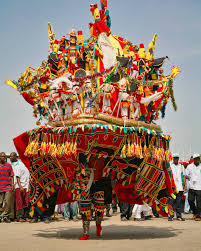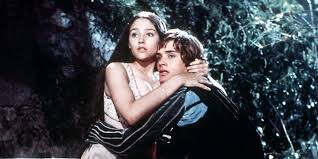The Ijele Masquerade Festival is one of Nigeria’s most vibrant and culturally rich celebrations, particularly among the Igbo people.
Known for its grandeur, the festival showcases the Igbo culture’s unique traditions, artistry, and communal spirit. The Ijele
masquerade itself is a towering, colorful, and intricately designed figure, considered the king of all masquerades in Igbo land.
The Masquerade Festival, known as the biggest Masquerade in Sub-Saharan Africa, is a tradition of the Igbo people of Nigeria In many communities
in the state of Anambra in South-Eastern Nigeria, celebrations, burial ceremonies, and other special occasions during the
dry season to evoke fertility and a bountiful harvest feature the performance of the Ijele masquerade.
Click here to check out the Festival: https://www.youtube.com/watch?v=_QrfkNjSYlo
A Glimpse into the Ijele Masquerade
The Ijele masquerade is not just a cultural artifact but a symbol of Igbo heritage and spirituality. Standing at over 12 feet tall
and often requiring up to 100 men to create, the Ijele is a spectacular sight. The structure is made from bamboo and cloth,
adorned with vibrant colors, mirrors, and symbolic decorations that represent various aspects of Igbo life and cosmology.
That Ijele originated from old Anambra State in Nigeria many centuries ago is not in doubt. According to UNESCO’s recent commentary.
The origin of Ijele according to available Oral story, emanated from Umueri. This very group performed the first
“izi egwu ijele”(introduction of the Mask) to other communities like Aguleri, Nsugbe, Ogbunike, Nando, Awkuzu etc. Its pertinent to note Umuatuolu Umueri was instrumental to the introduction of Ijele masquerades to Igbariamu, Nteje, and some other
Villages outside Omabala areas.
In recognizing the roles played by Umueri in the Origin of Ijele, the Old Anambra State Government unanimously selected
their Ijele Cultural troupe, led by Chief Obiako Raphael Anizoba (Agunech’ibe)of Umuatuolu village Umueri to represent
the State in Festival of Art & Culture known as FESTAC 1977 of which the groups won various Awards & accolades for
excellence from the Federal Government in. 1977.
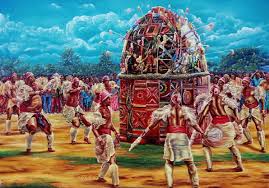
Historical and Cultural Significance
The Ijele masquerade dates back centuries and is deeply rooted in Igbo traditions.
serving as a bridge between the physical and spiritual worlds. The Ijele is often displayed during significant cultural events,
such as festivals, funerals of prominent individuals, and community celebrations, symbolizing prosperity, protection, and the continuity of life.
The Festival: A Display of Culture and Unity
The Ijele Masquerade Festival is a grand celebration that brings together communities to honor their cultural heritage. The festival
features a series of events, including traditional music, dance, storytelling, and the highlight—the procession and performance
of the Ijele masquerade.
Procession and Dance: The Ijele masquerade is paraded through the streets, accompanied by drummers, singers, and dancers.
The rhythmic beats of the drums and the vibrant dances create an electrifying atmosphere. The masquerade’s movements
are graceful and deliberate, captivating the audience with its majesty and artistry.
Traditional Music and Dance: Beyond the masquerade, the festival is rich with traditional Igbo music and dance performances. These performances showcase the cultural expressions of the Igbo people, featuring instruments like the udu, ogene, and ekwe.
Storytelling and Oral Traditions: Elders and griots share tales of Igbo history, myths, and legends, preserving the
oral traditions that have been passed down through generations. These stories provide insights into the values, beliefs, and
social structures of the Igbo people.
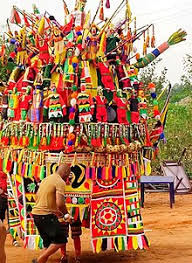
Art and Craft
The Ijele masquerade is a masterpiece of craftsmanship. Artisans spend months creating the intricate details of the masquerade,
from the elaborate headgear to the multi-layered skirts. The craftsmanship reflects the creativity and skill of the Igbo people,
making the Ijele not just a cultural symbol but also an artistic marvel.
Costume
Ijele Mirror: This mysterious mirror picks and sees anyone with charm or destructive weapons. The mirror magnets the person
to Ijele for punishment. This mirror is reflective and creates an aesthetic beauty.
Ijele Python: This is a big snake signifying royalty and mightiness of Ijele. Ijele Cloth / Fabrics: Ijele fabrics popularly known
as Ododo is expensive, colorful velvety materials. It has all colors but yellow, black and red are pronounced.
Ijele Trees, Animals, White men, Carved Human Activities: All these signifies wholesomeness of the masquerade as
every aspect of human life is depicted on Ijele masquerade.
Mermaid Objects: Ijele is crowned up with mermaid objects signifying Ijele as the greatest of all masquerades.
Ijele Horse: The horse represents majesty and greatness.
Symbols
The Societal Impact & Significance of Ijele :Ijele has political, spiritual, social, psychological and recreational significance.
Spiritual / Social: Ijele performs at the burial ceremonies of great and powerful kings or special men and women in Igboland.
It also performs at the burial ceremony of any member of the Ijele family or at the death of the oldest man in the community. Ijele mostly perform during the dry season to mark fertility and annual bountiful harvest. It can equally perform at special festivals and occasions.
Political: Ijele gives the people the opportunity to re-affirm their loyalty. This affirmation comes in different ways, for example,
dancing alongside the Ijele as it pays homage to a Chief or King, show ones total loyalty. If Ijele can bow, who else can not bow!
Its worth to note that Ijele will never step out to perform unless Seven (7) Cannon gunshot are released to the air alongside the
sound of its royal music. Therefore, its would be nice to sum it up that Ijele is a Spiritual bond between a range of Communities
in Anambra State of Nigeria which is harbinger of peace, amity, dialogue and a high sense of communality.
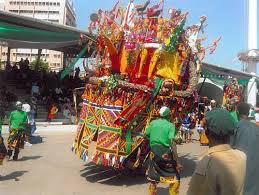
Ijele Music
Ijele has a special brand of band group that entertains it whenever he performs. It dances majestically to the royal band group
called and known as “Igba-eze” – Royal Band group or literally known as drums of the Kings popularly called “Akunechenyi” in Igbo language. The musical instruments includes 4 drums, ogene, ubom, uyo, Ekwe, flute (Oja – ufele), wooden clapper (aja – oja) amongst others.
In Conclusion:
In modern times, the Ijele Masquerade Festival has taken on additional significance as a means of cultural preservation and education. It provides an opportunity for younger generations to learn about and appreciate their heritage. The festival also attracts tourists, fostering cultural exchange and promoting Nigeria’s rich cultural diversity.
If you’re planning to experience the Ijele Masquerade Festival, it’s advisable to visit during the dry season, usually between November and April, when most traditional festivals take place. Locations vary as the festival is celebrated in different communities across Igbo land, including Anambra, Enugu, and Imo states. The Ijele Masquerade Festival is more than just a celebration; it is a profound expression of Igbo identity and spirituality. The festival’s vibrant displays of music, dance, and art offer a unique glimpse into the rich cultural tapestry of Nigeria. Whether you are a cultural enthusiast, a history buff, or simply looking for an unforgettable experience, the Ijele Masquerade Festival is a must-see event that promises to leave a lasting impression.
Read More: https://placesandlifestyle.com/the-ibom-heritage-festival/

